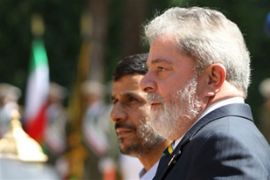Iran urged to be flexible on talks
Turkey and Brazil call on Iran to be open in talks with the west over nuclear programme.

Iranian President Mahmoud Ahmadinejad had ordered a freeze on the nuclear talks with P5+1 group of world powers, Britain, China, France, Russia, the United States and Germany, until the end of August.
New EU sanctions
The European Union said on Sunday it will hit Iran with tough sanctions against its vital oil and gas industry on Monday in a bid to lure Tehran back to the negotiating table.
“This (package of sanctions) is about applying pressure, but applying pressure in order to bring the Iranians to the table to talk,” a European diplomat said.
EU foreign ministers will formally approve the sanctions following Iran’s repeated refusals to halt sensitive nuclear activities, which the West fears are aimed at building a bomb.
Iranian President Mahmoud Ahmadinejad warned the EU against imposing unilateral sanctions, saying Tehran would react swiftly and cause “remorse.”
“We do not welcome any tension or a new resolution. We seek logic and friendship,” Ahmadinejad said in remarks directed at the EU, which were translated into English by the Press TV channel.
“I should tell you that anyone who adopts a measure against the Iranian nation, such as inspection of our ships and planes, should know that Iran will react swiftly,” he said.
Deal dead?
Al Jazeera’s Anita McNaught, reporting from Istanbul, said that despite potential difficulties, the framework of the nuclear swap-deal between Iran and Brazil was so far being adhered to.
“Up until now, the agreement has been followed pretty much to the letter,” she said.
She said Turkey was anxious not to be seen as taking the Iranian side in the dispute. “The Turks are keen to reiterate that they are not defending Iran per se, but only its rights as a sovereign nation,” McNaught reported.
“They [Turkey and Brazil] feel they have been misunderstood because they never expected, or never said that the Tehran declaration would solve all the outstanding Iranian nuclear issues and disagreements,” McNaught reported.
“It had opened up areas that hadn’t been opened up before. And they were doing it in the cause of world peace”, she said.
Under the terms of the agreement, Iran will transfer 1200 kg of low-enriched uranium to Turkey and receive 120kg of 20 per cent enriched uranium for use in a medical research reactor within a year.
At the time it was agreed, the US and its allies said that the deal did not see Iran giving up enough of its low enriched uranium and pushed ahead with imposing a new round of UN backed-sanctions.
Turkey and Brazil voted against the new sanctions because they felt that their deal made the measures unnecessary.
“Certainly Turkey and Brazil feel that in a broader sense it has been a bit of a thankless task, but they still believe in the Tehran declaration. More importantly, Iran believes in the Tehran declaration and that is what we were hoping to establish today and we may be getting an answer,” McNaught said.
The latest UN sanctions were followed by unilateral punitive measures from Washington, and on Thursday the European Union agreed on a package of punitive measures targeting Iran’s energy sector.